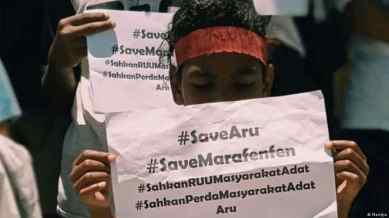Stay updated with the latest - Click here to follow us on Instagram
Indigenous Indonesians want EU support on land rights
As the EU and Indonesia work on a free trade agreement, one tribe is seeking European help on securing rights. Many indigenous peoples are at risk of losing their land as economic development increases.

Threatened Indigenous communities in Indonesia are turning to the European Union for support in light of diplomatic visits and negotiations between the bloc and Jakarta on a potential free trade agreement (FTA).
A few weeks ago, Indigenous human rights defenders from the remote Aru Islands addressed the European Parliament to draw attention to a legal battle over land rights, which is currently before Indonesia’s national court.
monthly limit of free stories.
with an Express account.
Activists say development of the archipelago located on the eastern margins of Indonesia has become a prime example of land grabbing and violations of Indigenous peoples’ rights.
“If we lose the case, we will lose everything. We will lose our people, our culture, traditions, and our fauna,” Indigenous human rights defender Maritjie, who asked not to reveal her last name for security reasons, told DW.
Social media campaigns have been launched on Twitter, Facebook and other websites under the hashtag #SaveAru to amplify the work of Indigenous activists. However, since 2021, it has become more difficult to voice criticism of the government.
“In Indonesia, we have the Information and Electronic Transaction Law (ITE Law). It is not easy for us as human rights defenders to raise our voices on social media. Sometimes when we criticize the government, we are recognized as rude people,” Maritije said.
Ayu Islands on the development frontier
For decades, the Aru Islands have escaped the attention of companies that have cleared Indonesia’s rainforests. But there are signs the Aru Islands could be the next victim of Indonesian deforestation.
According to data from Global Forest Watch, Indonesia lost 9.95 million hectares of primary forest between 2002 and 2021, making it one of the top five countries globally for forest loss over the past two decades.
Several groups are interested in developing the archipelago. These include the Menara Group, a conglomerate that wants clear forests for a sugarcane plantation, and the Indonesian Navy, which wants to use the land for military purposes.
“The seizure of customary lands by the Indonesian Navy and National Development Projects will eliminate the main source of livelihood for indigenous people,” Eko Cahyono, senior researcher at the Sajogyo Institute, an NGO, told DW.
According to Cahyono, the indigenous peoples in Aru, and across Indonesia, have a close relationship and dependence on the forests, seas, mountains, and natural resources. Seizing their land could ultimately destroy their lives, he added.
Asking Europe for support
Maritije urged European representatives to put pressure on the Indonesian government on keeping land in Indigenous hands.
“We are rich in all the things we own. But the government of Indonesia thinks we do not know how to manage our land. Even if we do not know how to manage it, we can learn,” she said.
Yance Arizona, lecturer at the Faculty of Law at the Gadjah Mada University in Jogjakarta, told DW that negotiations on a free trade agreement allows Europe to use its leverage to support Indigenous rights.
“I think that there is a chance for Europe to include the protection of Indigenous peoples’ rights as part of the trade agreement. The idea of an inclusive trade that ensures that the FTA not only benefits the business of both partners, but also more vulnerable people, like the Indigenous peoples,” Arizona told DW.
In August 2022, on the International Day of the World’s Indigenous Peoples, the EU announced it would invest €7 million ($7.04 million) in supporting indigenous peoples’ rights worldwide as part of the Global Gateway investment package.
“The EU will invest in enabling indigenous communities to monitor and report human rights abuses and environmental damage,” a statement said.
No legal protection of Indigenous rights
Indonesia is home to an estimated 50 to 70 million Indigenous peoples (18% to 19% of the total population), according to the International Work Group for Indigenous Affairs (IWGIA).
Arizona said that Indigenous communities are not reluctant to development. “Especially in areas like Sumatra, I have found many local communities welcome investment. What they oppose is the loss of their land,” law lecturer Arizona said.
However, in Indonesia, there are no legal protections for Indigenous peoples’ rights, and this removes them from the decision-making processes.
“To fully understand the situation of Indigenous peoples’ rights in Indonesia, one must look beyond the constitution. The government is not serious about developing a legal framework for the protection of Indigenous rights in Indonesia,” said Arizona.
According to Arizona, the current legal procedure for Indigenous peoples in Indonesia, to be entitled to customary land rights, is complex and involves many state actors.
In the case of the Aru Islands, the community must obtain legal status as an Indigenous group and a decree from the government on their land and forest rights, which takes a long time.
If the Aru peoples hope to succeed in their land rights struggle, legal reform is necessary. “If they do not have a legal basis for their land rights, it is easy to dismiss them. A good law is a precondition for resolving many Indigenous land conflicts in Indonesia,” Arizona said.